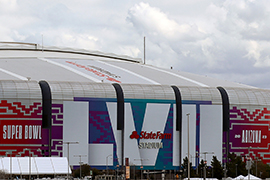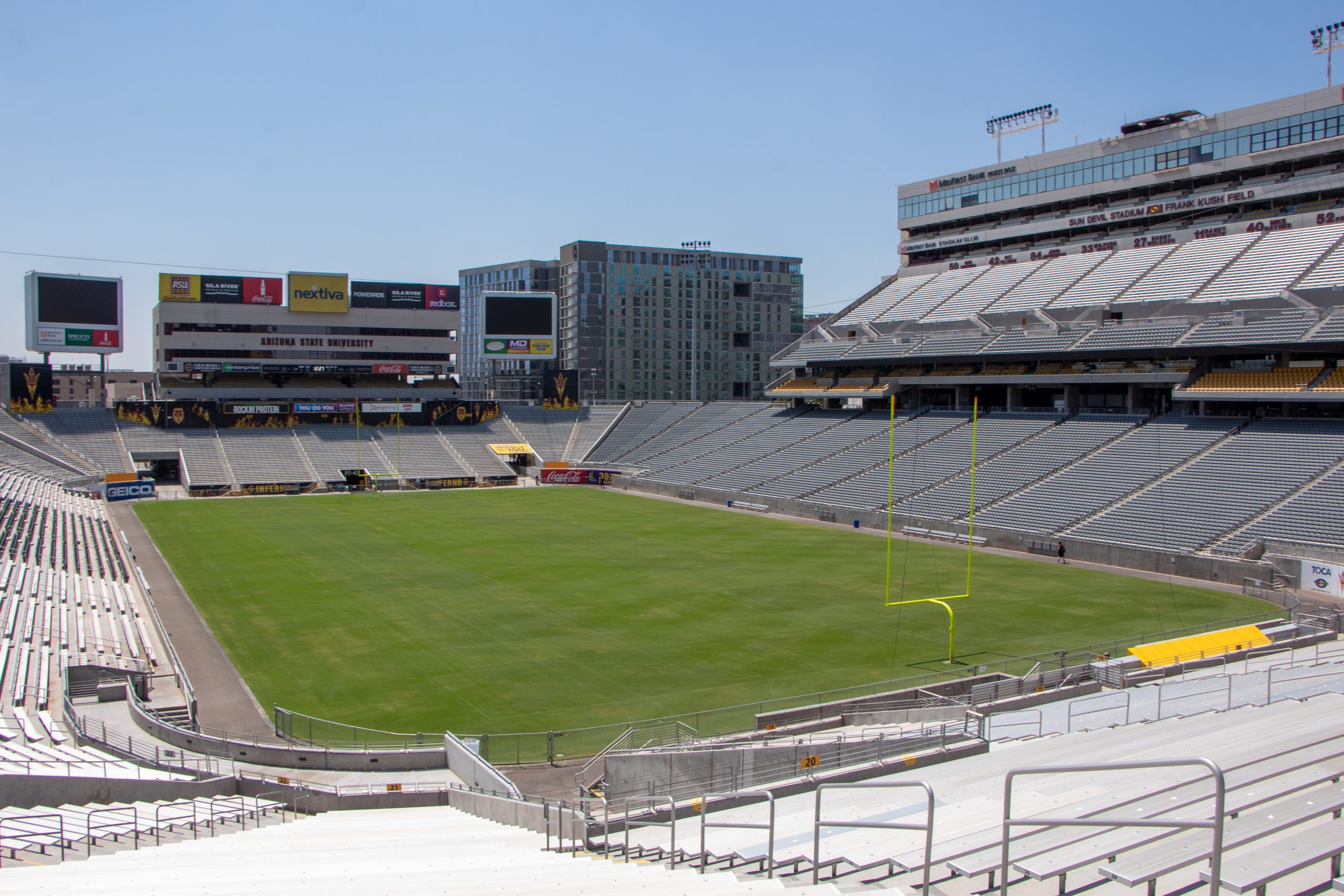- Slug: BC-CNS-Super Weather,900.
- 2 photos, videos on the game forecast, the WM Open forecast, weather history and impact available (thumbnails, captions below)
By Payton Major
Cronkite News
PHOENIX – Signs of the Super Bowl grace the streets of the Phoenix metro area. But despite Phoenix’s sunny reputation, travelers may have to deal with rain on the day of the big game.
Phoenix Sky Harbor International Airport is expecting a surge in passengers leading up to and after the Super Bowl.
But visitors may be wondering: should they pack sunscreen – or an umbrella?
Super Bowl Sunday forecast
Arizona has experienced a colder than average start to 2023. In Phoenix, 22 of the 31 days in January had below-average temperatures. The National Weather Service in Flagstaff also said the city experienced its third-snowiest winter on record.
“Believe it or not, Arizona has two ‘wet’ seasons: summer and winter. January and February are part of Arizona’s wet winter season, but Arizona’s precipitation is highly variable,” said Erinanne Saffell, Arizona state climatologist. “Maricopa County averages around an inch of precipitation each January and February, mostly in the form of rain, but sometimes even as hail or graupel.”
This week has had a much-needed warm-up. Phoenix has experienced temperatures in the upper 60s and low 70s since Monday. High pressure has been focused over the Southwest, resulting in mostly clear skies.
“Fortunately, Arizona is expecting a great mid-February this year. The average temperature in Phoenix on Feb. 12 is around 70 degrees, and so far, the forecast looks to be near that temperature,” Saffell said.
Friday is expected to be sunny and in the mid-70s; a beautiful day to attend the WM Phoenix Open and to kick off Super Bowl weekend. Some breeziness will also begin Friday with winds gusting around 10-15 mph.
Saturday will be the warmest day, with temperatures forecast to be in the upper 70s. Clouds will begin to enter the Phoenix area in the afternoon hours. The National Weather Service in Phoenix warns that low humidity and high temperatures can increase the risk for dehydration and heat-related illnesses, especially for those not acclimated to the desert weather.
“Those planning to be outdoors should take steps to remain hydrated and wear sunscreen,” the NWS Phoenix website says.
The next weather system arrives Sunday, on Super Bowl game day. High temperatures will be in the low 70s, and there is a very small chance for some light, scattered showers in the evening and overnight hours. Expect a cloudy day compared to Friday.
Those attending the game might want to plan for some light rain when they leave. Jesse Shuter, communications coordinator for the NFL, said the State Farm Stadium roof in Glendale will likely be open, pending weather conditions. If the roof were to be closed, the inside temperature would be 70 degrees.
“Winter storms can change up the forecast, so we’ll have to keep watching until we get closer,” Saffell said.
Arizona Super Bowl climatology
This is the fourth time that the Valley has hosted the Super Bowl. However, not every game has been as sunny as this weekend.
Arizona’s first Super Bowl was on Jan. 28, 1996, at Sun Devil Stadium in Tempe. It was the last time the Super Bowl would be hosted on a college campus. The Grand Canyon state was a long-awaited destination for the big game.
On that day 27 years ago, the high temperature at kickoff was 67 degrees, and the overnight low was 42 degrees. It was clear and sunny for the Dallas Cowboys and Pittsburgh Steelers, and the over 75,000 people who attended.
The next game was on Feb. 3, 2008, at State Farm Stadium in Glendale, called University of Phoenix Stadium at the time. The New York Giants and the New England Patriots took the field to compete in the 42nd Super Sunday.
The high temperature was 63 degrees, and the low was 45. However, there was some rain that prompted NFL officials to close the stadium roof before the game, making the indoor temperature a comfortable 70 degrees.
The last Super Bowl in Arizona was on Feb. 1, 2015, also in Glendale. The New England Patriots returned to the Valley to play the Seattle Seahawks. The high was 69 degrees, and the low was 50 degrees. There was no rain at that game eight years ago, and the stadium roof was open.
Surprisingly, the warmest Super Bowl wasn’t in Arizona. Last year, the high for the game in Los Angeles was 85 degrees.
Are the Eagles and Chiefs prepared for the desert?
Weather plays a major role in how well football teams do throughout the season. And with the Kansas City Chiefs and Philadelphia Eagles, it was no different.
Since September, the Chiefs have had to endure all sorts of weather conditions. Their average high during game day this season was 61 degrees and the average low was 39.
One of their first games of the season was in Glendale, when they defeated the Arizona Cardinals in a sizzling 103 degrees. The last few games have been the polar opposite. They beat the Seattle Seahawks at home when it was 20 degrees on Dec. 24, and endured snow for their last two playoff games at home.
Rain has been a good luck charm for the Eagles this season. The team won all six games played in the rain. In a victory against the Jacksonville Jaguars, a record-breaking 2 inches of rain fell in Philadelphia. The previous daily record was 1.80 inches in 2015. The average high temperature during their game days this season was 58 degrees, and the low was 43.
The Chiefs and Eagles take the field in Glendale on Sunday at 4:30 MST.
^__=
The State Farm Stadium roof in Glendale will likely be open for Super Bowl LVII, pending weather conditions. (Photo by Dylan Nichols/Cronkite News)
The Sun Devil Stadium in Tempe hosted the first Arizona Super Bowl in 1996. It was the last time a Super Bowl was held at a college campus. This photo was taken on Jan. 30, 2023. (File photo by James Franks/Cronkite News)

